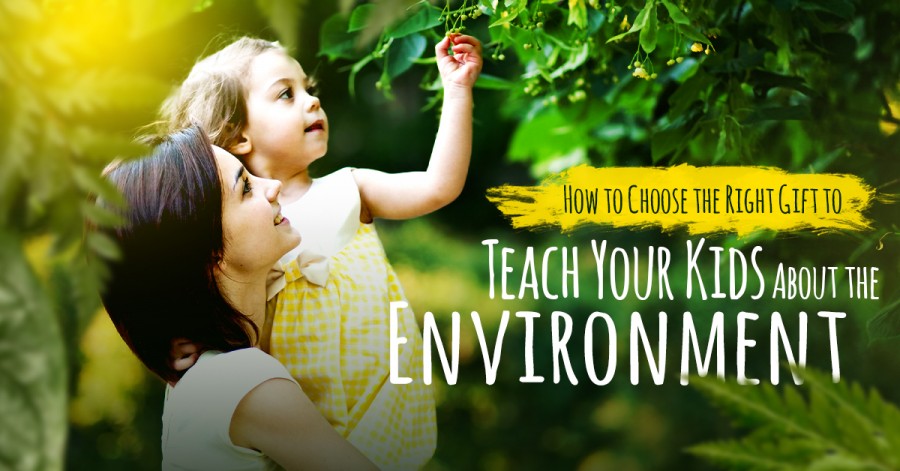How to Choose the Right Gift to Teach Your Kids About the Environment
Published 22 July 2022 at 16:22
Tickikids Blog Dubai > After-School Activities > How to Choose the Right Gift to Teach Your Kids About the Environment

As a parent, it is your responsibility to teach your child about the environment. Unfortunately, there are a lot of climate change deniers in the public sphere, some of whom may have an influence over your child. If you do not teach your child about the importance of protecting and preserving the environment from a young age, then climate change deniers could plant seeds of doubt in your child’s mind about protecting the environment and could lead to them living lives of carelessness and selfishness.
Teaching your child about the environment can be very difficult, though. Anybody that has ever tried to teach a child about something as important as the environment before will know this. One of the most challenging parts of teaching children about the environment is knowing where to start. There are so many different subjects and topics that need to be covered for your child to get a proper understanding of the environment, which makes finding a starting point very difficult.
One of the best ways of teaching children about the environment is to give them gifts. This post will tell you about a few great gifts that you can get for your child, to help them understand why the environment’s so important:

Image Credit: Unsplash
How Do Gifts Teach Children?
Gifts won’t magically teach your children about the environment; you need to do that yourself. A gift is just a good way of communicating a message to your child. If you don’t communicate this message to them, then it will just be a gift. Whatever you are giving your child, make sure that you explain how their gift is going to contribute to the environment. Some sustainable gift companies send cards explaining how the product purchased from them has contributed to the environment.
If the gift that you have purchased for your child comes with an information pack, then be sure to explain this to them. Always explain the message behind your child’s gift to them.
Zero Waste Gifts
One of the largest contributing factors to climate change and carbon emissions is the production of plastics and other packaging materials. A good gift to give your child is a zero waste gift because it will give you an opportunity to tell your child why they should take recycling and environmental preservation seriously. According to the gift-giving experts from https://www.trvst.world/sustainable-living/ethical-gifts/zero-waste-gifts/, choosing zero-waste gifts will cause little or no harm to the environment. Owning a zero-waste product is something that your child can be proud of.
Recycled Clothing
Many of the fashion industry’s largest names are now offering clothing items constructed from fully recycled material, for example, Patagonia sells shorts made from recycled fishing nets. If you want to really teach your child about the environment through gifts, then you could consider buying them this sort of clothing, and then giving them a lesson on why it’s important to wear sustainable clothing and what makes their clothing different from other people’s. If you are going to encourage your child to wear sustainable clothing, then lead by example and wear this kind of clothing yourself.
Battery-free Toys
It’s very common for people to give their children toys that contain batteries. Unfortunately, every year there is 150,000 tonnes of battery waste. Batteries are extremely bad for the environment, so by buying your child toys that contain batteries you are contributing to this huge amount of waste. If you are going to buy your child toys that contain batteries, then you should go out of your way to make sure that they are rechargeable batteries. A rechargeable battery poses no threat to the environment post-production.

Image Credit: Unsplash
Funding Education
At some point as a parent, you will have to pay for your child’s college education. One gift that you can give your child is creating a college fund for them. While a college fund might not seem environmentally friendly, by giving them the gift of money, you won’t contribute to the production of products that could be harmful to the environment or landfill waste. You should tell your child why are you doing this, so that they can understand the point of your actions and understand the message behind them (as already mentioned in a previous section).
Outdoor Experiences
You should get into the habit of taking your child out on adventures as often as you can. However, some adventures should be reserved for special occasions. You can actually give your child environmentally-friendly experiences as a gift. You could take them to a wildlife reserve or even rainforest biomes, like the ones in Cornwall, England. Regular outdoor experiences will teach your child about the importance of nature and help them to understand why they need to protect the environment. Make sure to regularly take them out to the woods and other places for fun adventures, too.
Adopting Animals
You could consider adopting an animal for your child. Your child will then be sent regular updates, featuring information about their adopted animal, as well as photographs. If you live near to where the animal is housed, it is possible for you to actually take your child to visit their animal. Adopting an animal is an affordable and fun way to teach your child about wildlife preservation and the good work that nature reserves do. If possible, try to sponsor an endangered animal, so that you can teach your child about initiatives launched to protect endangered species.
Encouraging Imagination
A lot of toys given to children nowadays don’t encourage their imaginations. Instead, the toys given dull their imaginations and suck any creativity out of them. Instead of giving your child a smartphone or laptop, why not give them toys and gifts that encourage their imagination and help them to be more creative? The sort of gift that you need to give your child to do this depends on their personality and their interests. Whatever it is, make sure that it’s something that they will appreciate and want to actually use, rather than something that they will ignore.
Wooden Toys
If you want to buy your child that’s something really environmentally-friendly for your child, then why not get them a wooden toy? A wooden toy is something that will not only not harm the environment (because wood can be regrown), but it will actually be able to be handed down to your children’s children as an heirloom. Wooden toys, as long as they are taken care of, can last for a lifetime. Make sure to buy wood that has been farmed sustainably, preferably hardwood, because it is more durable and better suited to children’s toys.
Buying Bicycle
A bicycle is a great gift to get for your child because it will give them a vehicle to explore the great outdoors. Getting outside into the woods and fields will help your child to develop more of an appreciation of nature. If your child lives in a city and has no method of escaping, then they will forever identify more with urban environments than they will with nature, which could prevent them from developing a love of wildlife.
In fact, it’s not uncommon for people who have grown up in cities to feel downright uncomfortable in nature. A bike can give your child a way to get out of the city safely, without relying on public transport or lifts from you.
Educational Books
If you want your child to care about the environment, then you could consider investing in books for them. A series of educational books authored on the subject of the environment and climate change will make for a great gift. Make sure that your child is able to read and old enough to appreciate educational books as a gift. If they are not old enough, then you could read them to them (if they are interested, that is).
Watching Documentaries
Television is inescapable in today’s day and age. There is absolutely no way that your child will be able to get by without watching it. At the very least, they will have to watch television so that they can keep up with the news and current affairs. If you are going to let your child watch these things on television, then you might as well also let them watch educational documentaries about nature. Nature documentaries can be a fantastic way of getting your child to care more about the environment, not to mention it can be a fun bonding experience between you both.
Buying an Animal
One extremely effective way of teaching young children that animals and nature aren’t playthings is to buy your child a pet. Most people who have dogs, cats, and other animals tend to grow up appreciating nature. If you are going to get your child a pet, make sure that they are competent enough to look after it first. You shouldn’t ever get your child a pet if you are not confident that they are mature enough to keep it safe, feed it, and generally just take care of it.
Staycations
A lot of families go abroad on holiday, but cruise liners and airplanes contribute massively to carbon emissions and cause a lot of damage to the environment. If you want to teach your child about the environment, then as a gift take them on a staycation somewhere. You could take them camping, which is a lot of fun. Taking your child camping can help them to really begin appreciating nature. If you take your child camping, then it could become an activity that they love and cherish forever and teach their child about.
Carving Kits
Another great way of helping your child fall in love with nature is to get them a carving kit, and some wood. Again, make sure that any wood you buy has grown sustainably. A carving kit will also give your child a hobby. They can whittle and carve out bits of wood. If they get good enough at it, then they can take it on as a part-time job and make money from it. You can sell wooden carvings for a lot of money, as long as they have been produced to a high quality.
Painting
Lastly, consider getting your child painting equipment. You can then take them out into a forest or somewhere outdoors and have them paint landscapes. You should only do this if your child is actively interested in painting. You should never force your child to take up any hobby that they are not interested in. If you try to force painting on your child, then they will grow up resenting it and won’t take it seriously. It may even make them feel contempt for the environment because your ultimate goal in getting your child to paint is to develop an appreciation for nature.
If you care about the environment, then you should condition your child to care too. Caring about the environment will help your child to live their life more sustainably and will prevent them from contributing to carbon emissions as they get older.